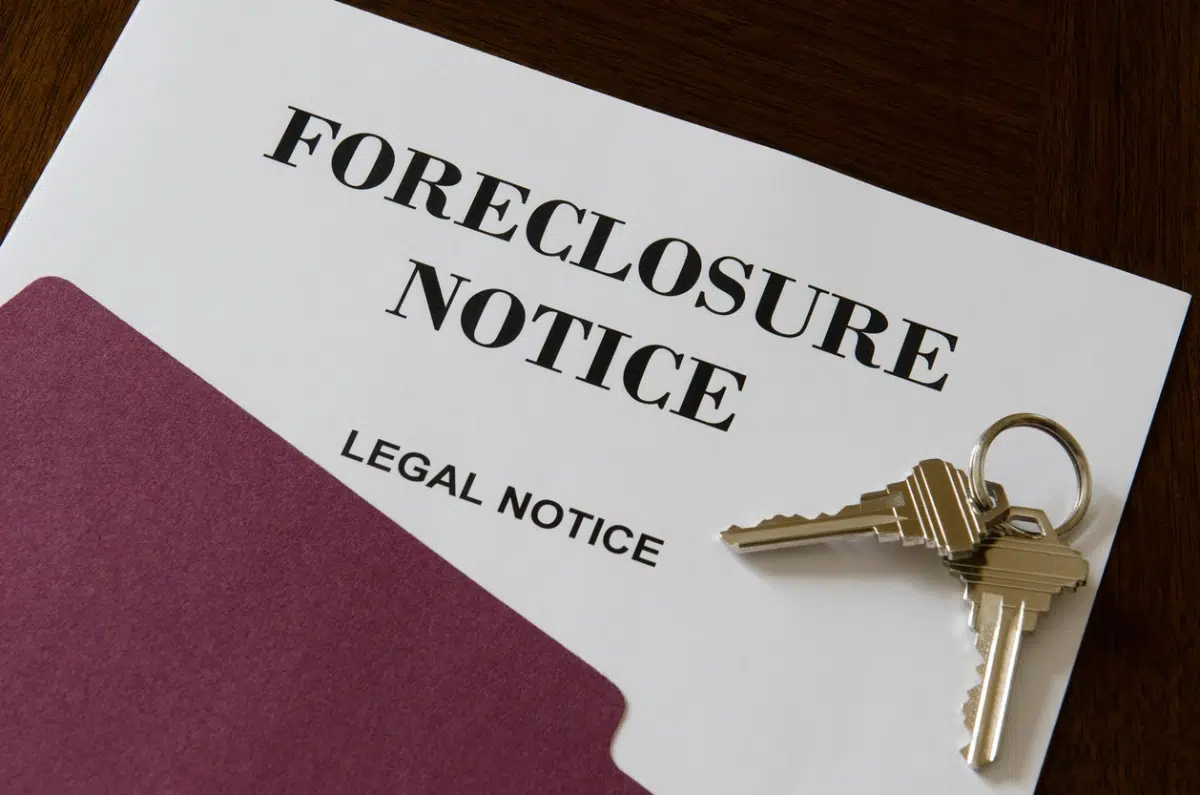
When most people think of foreclosure, they imagine a family losing their home in a residential foreclosure. Home foreclosure can be immensely difficult, but it at least comes with consumer protections.
If you’re a business owner facing commercial foreclosure, you may be dealing with aggressive lenders, feeling caught in a web of competing obligations, and facing real anxiety about your financial future.
As a commercial property owner, you don’t have to admit defeat as soon as you see foreclosure looming on the horizon. You may have legal options that will help you save your property and your livelihood. Here’s a look at how to stop a commercial foreclosure.
How Commercial Foreclosure Impacts Business Owners
Commercial foreclosures don’t happen overnight. If you’re facing the possibility of a business foreclosure, you’ve likely had trouble making mortgage payments for some time. The stress you are under may be more than just financial; the prospect of losing a business can be psychologically distressing.
The impact of a commercial foreclosure can last long after you’ve left the foreclosed property. These are some of the most critical ways commercial real estate foreclosures can affect business owners.
It May Be Much Harder to Secure Loans in the Future
When a homeowner loses a home to foreclosure, their credit score takes a hit. Likewise, if your property is lost in a commercial foreclosure, your business credit score can be seriously damaged. If you want to purchase a new commercial property or even secure a line of credit, it could be much more difficult to do so.
Any commercial loan or mortgage you do manage to secure could come with a high interest rate, cutting into your profits and making it harder to get your new venture off the ground.
Your Business Reputation May Be Harmed
Losing a commercial property to foreclosure may feel like a highly personal struggle. However, business foreclosure doesn’t happen in a vacuum. Your company’s good reputation can be harmed by foreclosure. Clients and other members of the business community may be hesitant to work with you in the future.
You May Lose Confidence in Yourself
Don’t underestimate the psychological harm that can happen during the foreclosure process. Having a property foreclosed upon can feel like failure, and you may be apprehensive about future ventures.
Many entrepreneurs bounce back from foreclosures or similar setbacks to ultimately find success, but it may take some time to feel confident enough to try again.
Understanding Judicial vs. Nonjudicial Foreclosures
In California, the foreclosure process for commercial properties is similar to the process of residential foreclosure. For both types of real estate, there are two primary forms of foreclosure: nonjudicial and judicial.
Nonjudicial Foreclosure
California state law allows for nonjudicial foreclosure if a loan document includes a power of sale clause. This process is extremely fast and allows the lender to bypass the court system altogether, so it’s not surprising that most commercial foreclosures in California are nonjudicial foreclosures.
Judicial Foreclosure
A judicial foreclosure requires your lender to file a lawsuit against you in court to take back the property. You have a certain amount of time to respond after your lender files the lawsuit. If you have a viable foreclosure defense, you may take the case to trial.
This process tends to be long and complicated, but it offers you ample opportunity to push back against the proceedings.
This can also include the lender seeking the appointment of a receiver through the court; this, in essence, would take all control of the commercial property out of your hands, including receiving any rents.
How Does the Commercial Foreclosure Process Work?
The foreclosure process doesn’t look the same for every commercial property owner. However, the steps usually look something like this.
You Receive a Notice of Default
Once you miss one or more mortgage payments, your lender will send you a notice of default. If you can catch up on missed payments at this time, you can stop the foreclosure process from going any further.
You Receive a Notice of Sale
If you’re unable to catch up on your mortgage, your lender can proceed to a foreclosure sale (also called a trustee’s sale).
The Property Is Sold
Your lender will sell the property to the highest bidder to try to recoup its investment.
You May Still Owe Money
You might think the foreclosure sale is the end of your struggles. However, you could still owe your lender, especially if the loan was underwater. For instance, if you owed $400,000 on your mortgage at the time of the foreclosure sale and the property sold for $300,000, you may owe the lender the $100,000 difference.
Even if you had equity in the property, you might have to repay some of the lender’s costs.
Legal Avenues to Halt a Commercial Foreclosure
Are you wondering how to stop a commercial foreclosure? You have options, but you need to act quickly. Even if you can’t keep your commercial property, avoiding an official foreclosure may help preserve your business, your reputation, and your finances.
These are some potential ways to avoid foreclosure proceedings.
Sell or Refinance Before You Default
If you see a foreclosure happening in the near future (but you haven’t yet defaulted on your loan), selling the property or refinancing it can protect your business and your credit. Try to resolve the issue before the lender takes over so that you can remain in control and protect the equity you’ve built.
Conduct a Short Sale
If your lender wins the foreclosure proceedings, it must organize a foreclosure sale. This takes time, money, and effort. Some lenders may be willing to let you arrange a short sale instead. A short sale doesn’t let you keep the property, but it does allow you to avoid the credit hit that comes with a foreclosure.
In a short sale, the lender agrees to let you sell the property for less than you owe on the loan. If you go this route, it’s worth asking whether the lender will consider forgiving the deficiency balance (the amount you still owe after the property sells). Otherwise, you may still owe the lender for the remaining mortgage balance.
Deed in Lieu of Foreclosure
If your lender has begun the foreclosure process (or is about to do so) and you see no viable way to keep the property, a deed in lieu of foreclosure may be the best choice.
This option is simple; you just give the lender the deed to the property. Because the lender doesn’t have to continue with the complicated foreclosure process, it might not try to recover a deficiency judgment against you.
Fight the Foreclosure in Court
Finally, you can hire legal representation to argue against the foreclosure in court. This option is more practical if you or your lawyer can identify an error made by your lender.
These are some common foreclosure defenses:
- The lender did not provide proper notice of foreclosure as required by your mortgage contract
- The lender did not follow California law when foreclosing on the property
- Your mortgage servicer broke the law or otherwise made major errors when handling your account
Fighting the foreclosure in court isn’t always a viable option. While lenders and mortgage servicers do make errors, they are fairly uncommon.
Alternatives to Litigation: Negotiation and Loan Modification
Many business owners who are dealing with cash flow issues ignore the problem or just hope it will go away. By the time they’re ready to confront a potential foreclosure, it may be too late.
When your commercial property is in financial peril, acting early can help you avoid foreclosure. The first step is to communicate with your lender as soon as you suspect you’ll have trouble keeping up with the mortgage. Since surprisingly few borrowers take this step, your lender may be willing to work with you, at least within reason.
If your business is facing temporary financial difficulties, you can try to negotiate a pause on payments. However, if the problem is likely to be long-term, you and the lender may opt to modify your loan. A loan modification can be a hassle for lenders, but they may prefer it to the complicated process that happens when a borrower defaults.
Here’s an example. Imagine that your commercial mortgage is $10,000 per month. You’re bringing in barely enough to cover all of your bills, and if your mortgage were slightly lower, you think you would be more financially secure. You bring up your cash flow struggles to your lender, who agrees to extend the term of your mortgage and lower the payments to $8,000 per month.
It may be easy enough to modify your loan by communicating with your lender. However, not all lenders are inclined to work cooperatively with their clients. If you’ve tried to negotiate but have been unsuccessful, it’s worth seeking out legal help.
Financial and Operational Impacts of Foreclosure on a Business
Most business owners know that foreclosure is a bad thing. However, not everyone stops to think of the massive impact a foreclosed property can have on their business.
These are some of the most significant potential impacts on your finances and operations.
Disruption of Day-to-Day Operations
Losing your commercial building could make it difficult or impossible to continue with your daily operations. Unless you can manage your business remotely or quickly find a new commercial space, operations may grind to a halt.
Asset Loss
When you buy (as opposed to lease) a commercial property, you’re making an investment. If that property is then foreclosed upon, you can’t count on your equity anymore.
Surprise Tax Liability
If you owe a deficiency balance on your mortgage after a foreclosure sale, your lender might forgive it. However, you’ll likely have to pay taxes on the forgiven amount. When you’re already facing financial struggles, this additional tax liability can be especially damaging.
Trouble Rebuilding
If your business goes through commercial foreclosure, the combination of credit damage and reputational harm may make it difficult to bounce back.
When Bankruptcy Becomes a Viable Option
Sometimes, a homeowner who is financially struggling will declare bankruptcy to halt the foreclosure process. Business owners can do the same, but it’s not generally wise to declare bankruptcy for the sole purpose of avoiding foreclosure.
If you have reached a point where your company won’t be able to recover financially, declaring bankruptcy may not be practical. However, if you think your company can get back on its feet with some financial planning, consider declaring Chapter 11 bankruptcy.
Filing for Chapter 11 will place an automatic stay on foreclosure proceedings. You must then submit a plan to reorganize your company’s debts, including your mortgage.
Bankruptcy law is far more complex than many people realize, and it’s seldom a good idea to go to bankruptcy court without legal help. If your main goal is avoiding foreclosure, an attorney can look over your situation, review possible defenses to foreclosure, and help you decide whether declaring bankruptcy is the best choice.
Why Timely Legal Advice Can Make or Break Your Case
Understanding how to stop a commercial foreclosure can be helpful. However, unless you’re deeply familiar with the laws surrounding commercial foreclosure in California, the best way to improve your chances of keeping your property is to consult a foreclosure defense attorney — and to do so as quickly as possible.
Because California has far fewer laws to protect business owners than homeowners, commercial foreclosure can happen in the blink of an eye. The sooner you seek out legal services, the more options you can explore.
Facing Commercial Foreclosure?
The world of business real estate is full of challenges, and dealing with commercial foreclosure is one of them. The team at Estavillo Law Group has spent over a decade helping clients like you protect what they’ve built.
Commercial foreclosure is often quicker and far more brutal than residential foreclosure, but that doesn’t mean you should surrender without a fight. When you work with a foreclosure defense attorney, you gain a knowledgeable ally with legal experience in this complicated area of the law.
We know foreclosure law and real estate law, and we’re ready to put our negotiation and litigation experience to work for you. If you need a foreclosure defense attorney, don’t wait. Get in touch today for your free consultation!


